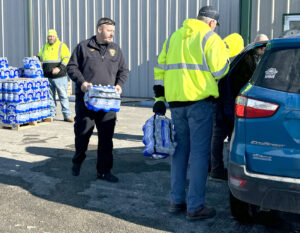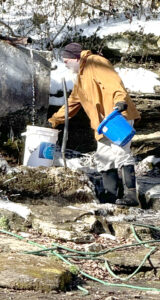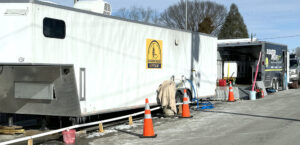Cold, ice, snow … but no water
James Bray is now in his third week of being Mayor of Albany after former Mayor Steve Lawson resigned on January 2, 2024.
During the last week, Clinton County has seen extremely cold temperatures with several inches of snow hitting the landscape and with that, major problems have surfaced that deal with the city and county’s water infrastructure.
The cold weather, along with sub-zero temperatures, have compounded the problem with the ability to supply water to the county.
Most of the issues started with the ability to get power to the raw intake pumps.
Once the raw intake pumps lost power, the pumps couldn’t effectively pump water to the water tank and therefore could not supply water to the water system.
When power was restored to the water intake pumps, the pumps couldn’t produce enough water to replenish the system and with all the leaks in the system already, the pumps got behind in pumping water to homes in the county.
Once all the leaks are located and repaired, water will be restored to each valve, making sure an even flow of water will be supplied to each home in Clinton County.
“We are going to further investigate this, but we think the distance in the line that provides electricity to the raw intake pumps is losing voltage,” Bray said. “Once it gets down to the pump and drops voltage, it shuts the inverters off. It shoots a code and says overload failure or phase loss. Where we got into the problem is we have been manually resetting it, so that’s a huge problem.
“Once you see that register at the plant, you have to get in your car and drive to the intake pump and figure out what’s going on. The crazy thing was RECC said we are getting the power. They checked the power from the line and we are getting the power we need according to them. We are getting the power to the line, but for some reason we aren’t getting it at the pump. When we go off of RECC’s grid it keeps shutting the inverters off. When you put the inverters on the generator it is fine.”
Toby Church with Commonwealth Engineers, Inc., responded with the fact the inverters could not be getting the power they needed during particular times of the day when people are home and pulling more power through the power grid, which could limit the amount of power going to the intake pump.
RECC has checked the power running to the intake pump and confirmed the power level was within normal range according to Bray.
“The thing was, when it kicked off, nobody caught it for like four or five hours,” Bray said. “During that time you are not pumping water and that’s huge. Then the huge kick in the butt was it did it again two days later. It was just a smack and then a smack on the other side. That was not what we needed.”
With crews out and about repairing and locating all the leaks in order to restore water to Clinton County, Bray is working from the inside in order to take the steps necessary to begin fixing the infrastructure of the water system to keep problems, like what citizens have faced in the last week, from happening again.
“Kentucky Rural Water has been here all weekend and they are great,” Bray said. “They have helped us find more leaks than we even knew we had. They help all counties in the state. They have the resources that the city doesn’t.”
According to Bray, Rural Water has brought in flow meters and listening devices that will be used to find leaks in the water system in order for workers to repair the leaks.
“They are here until the problems are fixed,” Bray said. “I also have Cumberland County and their water distribution team here. They are actively helping us find and fix leaks. I also have McCreary County’s water distribution team here. I’m going to reach out to Monticello and get them to come and help us fix some leaks.”
With most of the county out of water, most will contribute the issues with the water lines to be the extreme cold temperatures, but according to Bray, the problems have compounded over decades.
“It’s stemming from decades of a dilapidated infrastructure,” Bray said.
Church agreed with Bray and added the cold water and temperatures are a factor, but not the root cause of the issues.
“It’s kind of making the issues to where everyone can see it,” Church said. “You have leakage, which reduces your flow and makes water more susceptible to cold weather and makes it more susceptible to freeze. It’s a combination of things. With the weather warming up we will see some thawing of the pipes that are experiencing freezing and with these guys out there finding these leaks the pressure should be going up and we should be filling the tanks. There is a lot of things coming together and that’s going to help.”
In order to begin the rebuilding of the water infrastructure, Kentucky Rural Water and the City of Albany will begin a water study. Normally a water study takes anywhere from six to eight months to complete, but Church assured the mayor the study will be done in half that time.
“Mayor Bray and I are getting ready to start a study so we can apply for grant dollars from the state and federal governments so we can get some help correcting water plant distribution issues,” Church said. “That is step one and that will show us the problems.”
Bray said he has contacted all offices of our government, including Senator Rick Girdler, Representative Josh Branscum and Governor Andy Beshear.
“They are waiting in the wings to be able to supply us with what we need. We just don’t know what that is until we have received this water study,” Bray said.
Mayor Bray met with the Clinton County Community Foundation on Monday and the foundation has agreed to donate the funding to the city in order to get the water study completed.
“Today, hallelujah praise God, the foundation is going to give us 100 percent funding for this,” Bray said. “This is huge. Before we were going to have to file for a grant and that was going to take four to five months for them to even get it approved.”
The Clinton County Community Foundation is a non-profit organization and according to Bray, a contract has already been signed in order to start the water study which will cost around $40,000.
“As a foundation, we often lean in on our mission which helps guide our decision making process. ‘Clinton County Community Foundation brings together community minded people with the strong, abiding will to do good, acting upon our dreams and aspirations, to produce results,’” Vice President of the Clinton County Community Foundation Jessica Owens Sullivan said. “Ultimately, we unanimously agreed that we had to step up and help this community we love so much, but initially we were not all completely on board before going into the meeting with the mayor and Commonwealth Engineering. However, the facts staring us straight in the face made more than a compelling argument that helped us to get on the same page.
“We’re encouraged by the leadership taking charge of a very bad situation created from years of kicking the can down the road. It can’t be overlooked that our community came together, but our neighbors did too! How blessed we are to be in an area where your neighbors from Cumberland, McCreary and others stepped up to help us navigate this unique and unknown situation.”
Bray was extremely thankful to be getting the help Clinton County needed in order to get the ball rolling on this project.
“We want people to realize this isn’t going to fix any of the problems, but it will lay the foundation to fix everything,” Bray said. “It’s critical and key to allow us to file for grants from state, federal and local governments.”
Clinton County has two buildings that house the water distribution center with Plant A suppling around two million gallons of water a day and Plant B suppling around three million gallons of water a day to Clinton County.
Bray said Plant A is extremely close to falling apart.
“I wouldn’t feel safe putting anybody from my family inside that building,” Bray said. “It’s about ready to fall over, but it’s still producing water. There are trees growing out of the building. I’m not an engineer, but it doesn’t take an engineer to see that is bad.”
Everyday, more and more people are waking up to water back in their homes, but it is a process and will take time to restore water to the entire county.
“I just want the people to know this didn’t happen overnight and it’s going to take some time to fix it,” Bray said. “It won’t be fixed overnight. It’s working with a dilapidated system that’s went downhill for decades, but I’m going to fix it. With this council, we are going to fix this problem together and we’ve already started laying that foundation now.”
Once Albany starts to get funding for this project, Bray said one of the first things Albany needs is flow meters, which will help find leaks in the system more efficiently.
“Right now we have people just driving around and looking for leaks,” Bray said. “That’s the strategy we are using now. Isn’t that sad? The master meters we have are 50 years old. Monarch Engineering was with us for 35 years. Why would they not try to get funding for master meters for the city?”
Some of the changes Bray have made within the city has been changing the city’s engineering firm from Monarch Engineering to Commonwealth Engineering, Inc., as well as hiring a new city attorney, with Jeff Hoover, of Jamestown, Kentucky, taking over as of Monday of this week.
“I’m here right now with my right hand to the good Lord, with this council we will fix this,” Bray said. “My faith in humanity has been restored. Our community has come together in this time of need and the surrounding community has come to our need. I’ve had communities call me and wanting to do things like bring water, provide this and provide that … it’s humbling to know that there are people out there who are so interested in helping out and that’s America’s resilience. It’s been humbling.”
Bray said he has also been working with Judge/Executive Ricky Craig during this time.
“This has been the first time I’ve seen this much cooperation between the city and the county working hand in hand,” Bray said. “The county has cleared roads off for us in order to be able to get our chemical trucks to the water treatment plant, they have cleared roads off for us to get fuel to the generators to the raw intake pumps, and it’s been critical that they have worked with us and that’s how a community should work.”
It’s been a rough week for residents of Albany and Clinton County, not only having to bear bitter cold temperatures but snow and ice as well.
If the weather conditions wasn’t enough, many Albany residents and most all residents outside of the city limits were also dealt with a second blow when they found themselves without running water, a situation that lasted for days in some areas, and continues to plague areas of the county still.
The lack of water, due to the combination of the bitter cold temperatures, inadequate electrical supply at the Albany Water Department pickup station near Lake Cumberland’s 76 Falls and a host of other issues, sent residents in several different directions in search of water, potable and otherwise, including farmers needing water for livestock.
A large water tank was stationed at the Clinton County Extension Office for use by local farmers needing water for livestock.
In addition, several entities provided bottled water, again free of charge, to local residents. Water was distributed initially at the Albany Fire Department Headquarters, and also from the Clinton County Fairgrounds, shown in the photo below taken Monday morning.

Fresh water springs across Clinton County were also the scene of local residents collecting water to be taken home. Water is seen being collected in buckets at Town Springs at the bottom of Town Hill on Fairgrounds Road.
The Albany VFW Post, in conjunction with the Southern Baptist Association Disaster Relief, brought one solution to Albany in the form of two large trailers, one that provided hot showers for anyone without water and a second trailer that offered laundry service to anyone who needed to wash clothes. Both services, shown in the top photo, were offered free to those in need.
Churches and other facilities in Albany that did have water and shower facilities also opened their doors to those in need.





